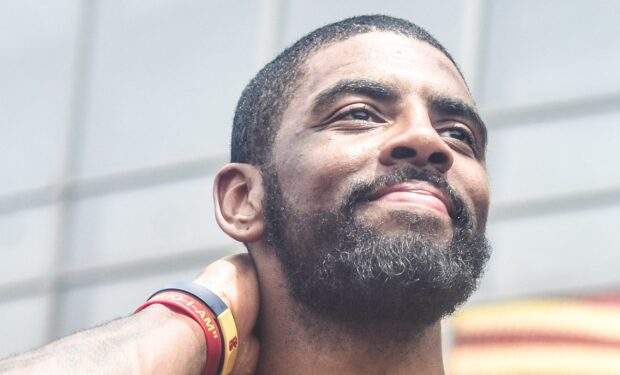NBA star (and scourge) Kyrie Irving posted a link to content widely considered anti-Semitic, as you have no doubt heard. Afterward, as the fallout from his promotion of such material became louder, Irving agreed to donate half a million dollars to organizations battling racial and religious prejudice.
But Irving’s financial commitment came without an apology for his action, to the dismay of nearly everyone affected.
Days later, under increasing pressure from the NBA and the Brooklyn Nets organization, Irving finally relented and issued a version of an apology. Yet for many, Irving’s mea culpa was still unsatisfactory — the Nets, for example, didn’t change a decision to suspend Irving for (at least) five games without pay, saying he was “unfit to be associated with” the team.
Here’s Irving before the apology, taking questions from the media:
Irving’s apology didn’t fly well for two reasons. First, it came late and seemed forced, compelled by outside forces. The second reason was the apology content itself: Irving’s positioning bore the textbook hallmarks of what psychologists sometimes refer to as a “fake apology by a Narcissist.”
Writing for Psychology Today, PhD Dan Neuharth lists 13 characteristics of an insincere apology by a Narcissist. Irving’s apology hits at least seven of them.
Irving’s text reads:
“While doing research on YHWH, I posted a documentary that contained some false antisemitic statements, narratives, and language that were untrue and offensive to the Jewish race/religion, and I take full accountability and responsibility for my actions. I am grateful to have a big platform to share knowledge and I want to move forward by having an open dialogue to learn more and grow from this.
“To all Jewish families and communities that are hurt and affected from my post, I am deeply sorry to have caused you pain, and I apologize. I initially reacted out of emotion to being unjustly labeled antisemitic, instead of focusing on the healing process of my Jewish brothers and sisters that were hurt from the hateful remarks made in the documentary. I want to clarify any confusion on where I stand fighting against antisemitism by apologizing for posting the documentary without context and a factual explanation outlining the specific beliefs in the documentary I agreed with and disagreed with. I had no intentions to disrespect any Jewish cultural history regarding the Holocaust or perpetuate any hate.
“I am learning from this unfortunate event and hope we can find understanding between us all. I am no different than any other human being. I am a seeker of truth and knowledge, and I know who I am.”
Here are a number of Neuharth’s Narcissistic Apology tells, and how Irving uses them.
- The Minimizing Apology: “I was just…” — Irving ends his apology by claiming “I am a seeker of truth and knowledge, and I know who I am.” In other words, he was just truth-seeking and he is unchanged (“I know who I am”) by the reaction to his post.
- The Shift-the-Blame Apology: “I am sorry that you…” — Irving writes: “I am deeply sorry to have caused you pain” (if that’s how what I did made you feel, I’m sorry.)
- The Conditional Apology: “I’m sorry if…”— Irving: “I had no intentions to disrespect any Jewish cultural history regarding the Holocaust or perpetuate any hate.” (bold/emphasis added)
- The Phantom Apology: “I regret…” Neuharth explains “Regret is a feeling. Apologizing is an action. Telling someone you regret what happened takes no ownership of hurtful behavior.” Irving writes: “I am learning from this unfortunate event.” This is not an event that happened to Irving, as a hurricane might happen to someone; posting the material was an action Irving did.
- The Whitewashing Apology: “I probably…“ Neuharth gives the example: “I probably shouldn’t have done that.” Irving writes: “I want to clarify any confusion…by apologizing for posting the documentary without context and a factual explanation outlining the specific beliefs in the documentary I agreed with and disagreed with.” (Translation: If Irving could go back, he would still post the video, but with an explanation of what he appreciated about it)
- The Nothing-to-Apologize-for Apology: “You know I...” example: “You know I’d never hurt you.” Irving writes: “I initially reacted out of emotion to being unjustly labeled antisemitic, instead of focusing on the healing process of my Jewish brothers and sisters…”
- The Pay-to-Play Apology: “I’ll apologize if…” Example: “I will apologize, but you have to forgive me.” Irving writes: “[I] hope we can find understanding between us all.”
- The Takeaway Apology: “I am sorry but…” Neuharth example: “I am sorry, but I was just speaking the truth.” Irving writes: “I am no different than any other human being. I am a seeker of truth and knowledge…”
Neuharth’s excellent explication of the Narcissist’s techniques to (kind of) say he’s sorry further quotes therapist Harriet Lerner, who said less technically of the difference between sincere and fake apologies: “More than anything, the hurt party needs to know that we really ‘get it,’ that our empathy and remorse are genuine.”
For many, including the Nets, “getting it” is not the note Irving struck with his words.
